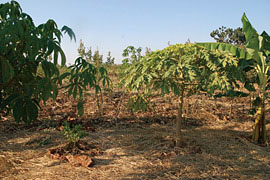The Mitsui & Co. Environment Fund
Introduction to Grant Projects
Department of Bioresource Science, Graduate School of Agricultural Science, Kobe University Professor Kazuyuki Itoh
Promotion of agroforestry through organic farming (permaculture) in Sub-Saharan Africa
Research grant
- Project Description
Population growth in Sub-Saharan Africa, a region that includes Malawi, is leading to a deterioration in the natural environment, a degradation of living environments and an increasing burden on agricultural environments. The situation has developed into a global environmental issue, one for which the international community calls to be resolved while maintaining a balance between environmental preservation and sustainable agriculture. In this research, we seek to take Malawian agriculture as a model for the promotion of agroforestry in a manner applicable throughout all of Sub-Saharan Africa. More concretely, we utilize a three-repetition randomized block design to compare test and control plots (for example, a comparison of grain harvests from a plot inflicted with root parasitic striga weed and a plat of mixed Gramineae and Leguminosae). We are then to: utilize methods to practically apply our test findings on site; and, that done, quantitatively assess the results. We are also to make preparations to facilitate the feedback of related technologies and their agricultural promotion/diffusion.
- Fields
- Marine resources/foodPreservation of surface soil and forestsPreservation of biodiversity and ecosystem
- Grant year
- FY2008 Research Grants
- Grant term
- 3 years
April 2009 - March 2012
- Grant amount
- 14,960,000 yen
- Activity region
- Africa south of the Sahara Desert, particularly Malawi

Overview of the Organization

- Representative
- Professor Kazuyuki Itoh
- Profile
- Specialist fields
Agriculture (tropical economic botany, weed science)
Affiliated academic societies
Japanese Society for Tropical Agriculture; Crop Science Society of Japan; the Weed Science Society of Japan; Pesticide Science Society of Japan
Background
In 1973 Graduated from the Department of Horticulture in the Faculty of Agriculture, Kobe University, and in 1974 Entered the Ministry of Agriculture, Forestry and Fisheries. In 1981 became a Researcher at the Department of Farmland Utilization, National Agricultural Resource Center. In 1989 was a recipient of Weed Science Society of Japan encouragement award for Ecology and Control of an Arrowhead, Sagittaria trifolia L., a Perennial Paddy Weed, and in 1995 pbtained a Ph.D., from Kyoto University in agriculture. In 1997 was appointed Director at the National Institute for Agro-Environmental Science, until 2005 when a position was taken as an Auditor at the Japan International Research Center for Agricultural Sciences. In 2005 was a recipient of the Weed Science Society of Japan achievement award for Pioneering research for occurrence of herbicide resistant weeds, and in 2006 became a Professor at the Department of Bioresource Science in the Graduate School of Agricultural Science, Kobe University, a position still held today - WEB site
- http://www.kobe-u.ac.jp/
- Collaborating researchers
- Noriharu AE, Professor, Soil Science, Graduate School of Agricultural Science, Kobe University; Atera EVANS, Rice Mill Manager, Lake Basin Development Authority, Kenya; Munthali MOSE, Soil Scientist, Chitedze Agricultural Research Station, Malawi; Satoyo ONO, President, Nippon International Cooperation for Community Development (NICCO); Mitsuharu TAKEMURA, /Master Program, Graduate School of Agricultural Science, Faculty of Agriculture, Kobe University
- Research record
-
- (1) K. Itoh, G. X. Wang and S. Ohba, 1999 Sulfonylurea resistance in Lindernia micrantha, an annual paddy weed in Japan, Weed Research, 39, 413-423
- (2) K. Itoh, 2004 Importance of bio-diversity of aquatic plants in agro-ecosystem for rice production. In eds. by B.A.Schaal, T-Y.Chiang and C-H. Chou, "Plant Evolutionary Genetics and the Biology of Weeds". Endemic Species Research Institute, Taiwan, P. 245-266
- (3) K. Itoh, 2003, The weeds strike back—weeds that have survived defoliants, Booklet 2, the Weed Science Society of Japan, pp.102, Zennokyo, Tokyo
- (4) K. Itoh and S. Hattori, 2000, The battle: mongoose, the halcyon and alien species, Yoshihiro Hayashi and Kazuhiko Takeuchi, editors. Gendai Nippon Seibutsu-shi 11, pp.170, Iwanami Shoten, Tokyo
- (5) B. Valverde and K. Itoh, 1999 World rice and herbicideresistance, Eds. S. P. Powles and D. L. Shaner," Herbicide Resistance and World Grains" p.195-249, CRC Press, New York